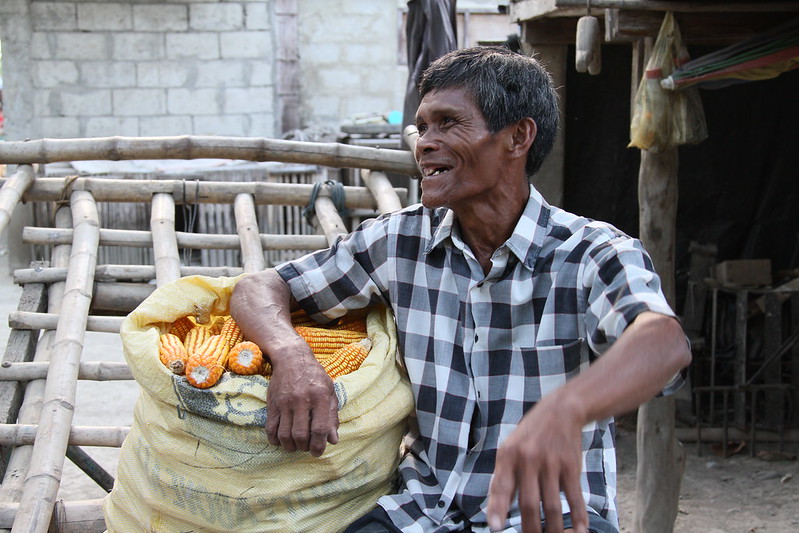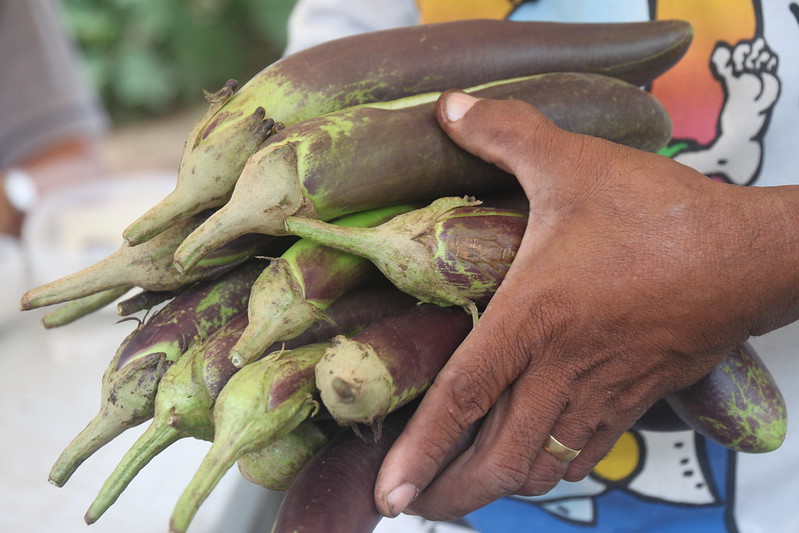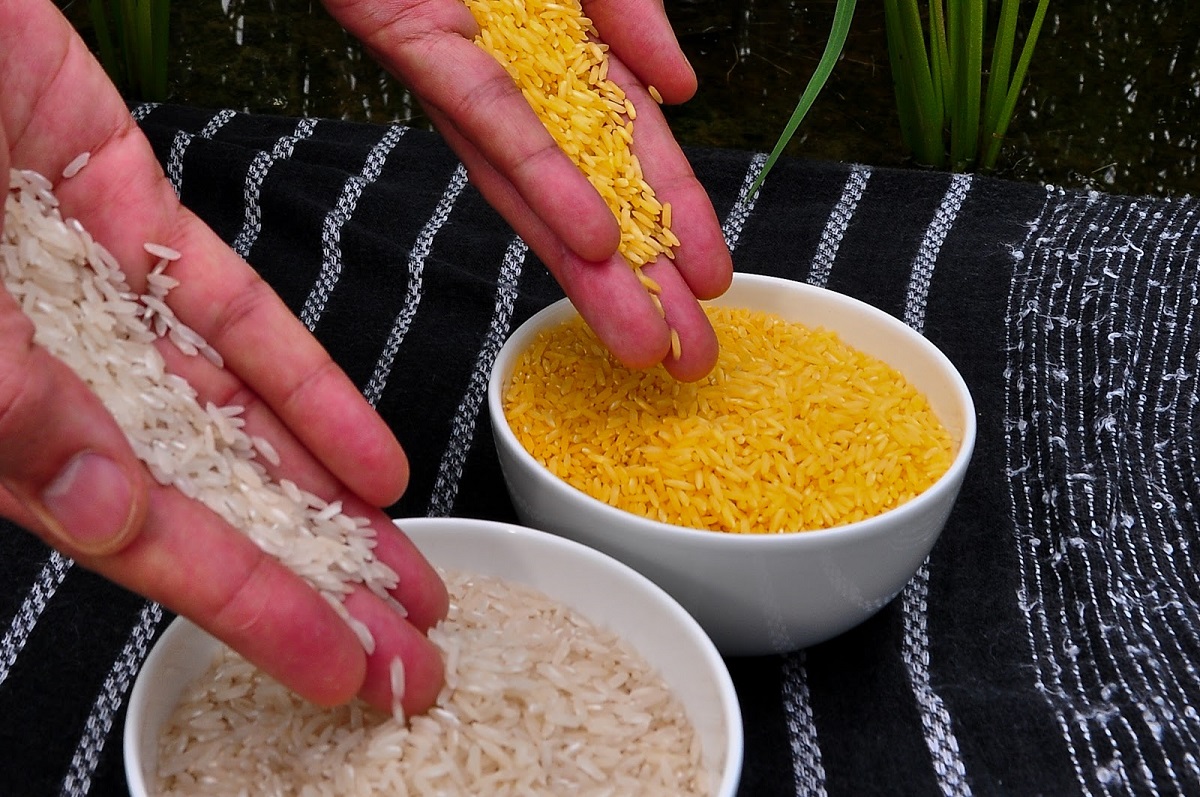Musings on Farming and Missing my Grandfather
| |
With the recent approvals of insect resistant eggplant and vitamin A-enriched rice in the Philippines, I felt delighted that Filipino farmers are getting access to new technologies. I was thinking of whom to share this great news to, but I couldn't think of anyone who would appreciate it best except for my grandfather. Sadly, he already passed on almost a decade ago.

My Lolo (grandfather) was a farmer.
My childhood was filled with memories of Christmas vacations in Nueva Vizcaya to visit my father's family. Our ancestral house is located right beside my Lolo's farm fields. Honestly, I didn't look forward to those vacations because staying in that house was not comfortable. First, the washroom was located a few meters away from the house, in a small cubicle made of nipa. The toilet seat was on the floor, err, on the soil. The kitchen, where we also dined, was just steps away from the pigsty and poultry yard. We would visit relatives who live in the farm by riding on kuliglig (a hybrid of a wagon and hand tractor used for farming), which gave me a trauma when my leg accidentally got stuck in between wooden slats. The moment we arrive at our grandparent's place, I would already start counting the number of days left before we head back home.
I think I was in high school when I started liking those vacations, without admitting it then. My favorite spot was the room on the second floor which was facing my Lolo's fields. I would open the Capiz windows, gaze at the stars, and admire my Lolo's rice and corn fields. There was one time that we went there for a summer break and I was nursing a petty high school heartbreak. That place comforted me the way our home couldn't. I would trade a month of Netflix time to go back to that scenery again on my sad days.
One time, I sat outside the door with my Lolo. I was holding my new MP3 player, which I got as a Christmas present from my mom. He was curious about the new technology on my hands and asked how to use it. I answered his questions cheerfully and even allowed him to use it, even if his hearing was bad already.
Most of my memories with my Lolo were like that—my Lolo and I sit somewhere outside the house, exchanging some stories of his old days and the present, then some shared silences glancing at his fields.
Years passed and I got a job at ISAAA. I write publications and develop campaigns to help the public understand new agricultural technologies and facilitate informed decisions about their adoption and use.
When my Lolo died, we were in the middle of a study tracing how farmers started planting genetically modified (GM) crops. Too bad I was not able to ask my Lolo about his farming adventures. By looking at his frail body, it's obvious how he worked hard all throughout his life. A farmer's life is never easy, as a Filipino folksong says. Their days start even before the sun rises. Stories about flooding, drought, and pests were also mentioned in his hand-written letters in Ilocano to my father.
If my Lolo would be alive today, I would have called to tell him about the breakthroughs in Philippine agriculture. Today, my Lolo would not fear about insect pests on his corn crops because insect resistant corn seeds have been available to farmers. There are also corn seeds that are not just insect-resistant, but can also tolerate herbicide. Thus, that would mean less time in the farm devoted to weeding. I just take comfort in the fact that about 673,000 Filipino farmers and their families are reaping the benefits of these corn technologies.
The same insect resistance technology has been integrated to eggplant and cotton, but is still not yet available to farmers as of this writing. Insect resistant Bt talong (eggplant) has been approved for food, feed, and processing—a necessary step before it gets approved for planting on Philippine soils. As for cotton, experiments in different locations in the country have been accomplished.

My father told me that when he was a kid, they would plant vegetables in their farm too. He would carry the vegetables on his back together with my Lola and sell them in the market. Some produce gets rejected when they don't pass the market standards. With Bt talong, the back-breaking efforts of vegetable producers will not be in vain because the fruits have no holes and worms. The farmers would also not need to spray or dip talong on a mix of insecticides, saving themselves, as well as their communities, from toxic chemicals.
I would probably tell Lolo with more excitement about the planting approval of vitamin A-enriched rice known as Golden Rice. Imagine planting not just something that fills the stomach but also something that boosts the immune system. Golden Rice provides healthier staple food to Filipino families, to help them have a normal vision, robust organs, proper growth and development, among other benefits of vitamin A. When farmers start planting this rice variety, I could imagine the pride they would feel as they contribute to the well-being and health of Filipino families.

With the current and potential benefits of GM crops, many farmers have been able to send their children to school, bought more farming equipment, and built houses they could call their own. One farmer said that when she started planting insect resistant corn, her worries at night about pest attacks were gone. She gained peace of mind that nobody can take away from her.
I wish I could tell all of these stories to my Lolo. However, his days on Earth are done and all I have now are my own days to live—to do my own work and live my mission, inspired by my Lolo's perseverance and resilience as a farmer. I will plant seeds, not of crops, but of knowledge, so that the benefits of new seed technologies will be known to farmers; and at the end of the day, the peace of mind I wished for my Lolo will be granted to them.
The perspectives expressed by the author do not necessarily reflect the views of ISAAA. The purpose of this article is to facilitate discourse on science and agricultural innovations.
| Newer Post | Archive | Older Post |
Science Speaks is ISAAA Inc.'s official blog. Weekly blog articles, authored by ISAAA writers, partners, and invited contributors, aim to help share, disseminate, and promote scientific knowledge and its vital role in achieving global agricultural sustainability and development. Your support to Science Speaks will help us achieve this goal. You can help us by donating as little as $10.

